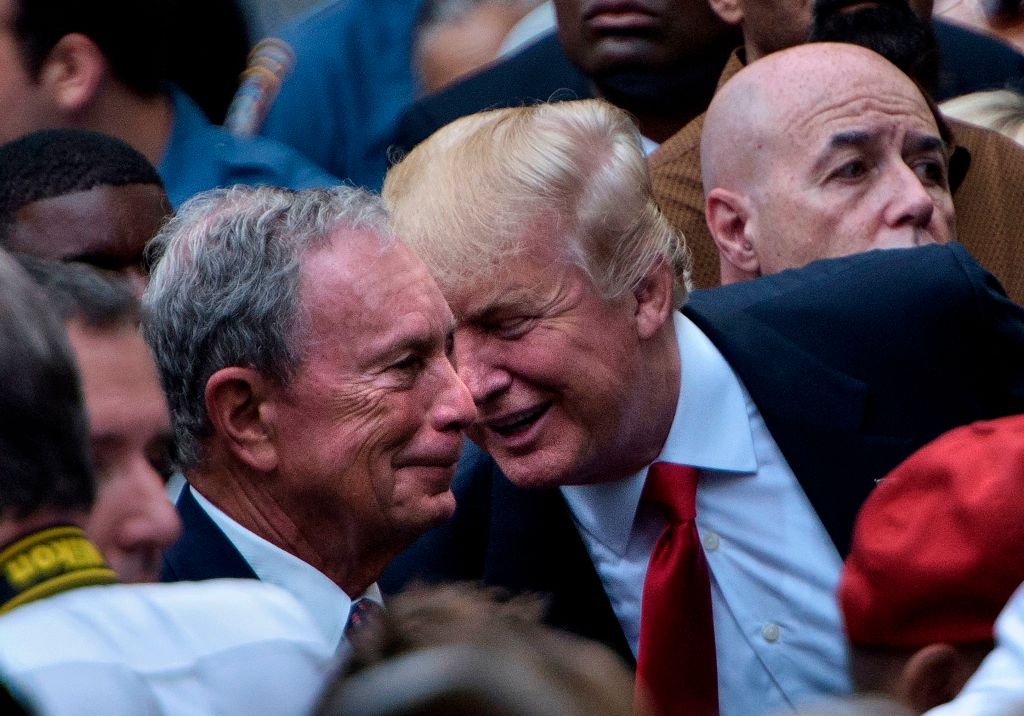‘The Establishment at CNN Doesn’t Want Sanders to Win’: Cable Insiders Grapple With Bloomberg, Bernie Coverage

Brendan Smialowski/Getty Images
TV networks and news organizations were lambasted for their coverage of candidate Donald Trump in 2016, with a popular consensus being that his rallies were covered uncritically, featuring little fact-checking, and with crudely personal fights with other candidates prioritized over investigations and reporting on the substance of the man and his policies.
Four years later, Democrats and watchdog groups want networks like CNN and MSNBC to heed these lessons in the coverage of billionaire Mike Bloomberg — and journalists at both networks told Mediaite they agree.
In interviews with six journalists at the major networks, three from CNN and three from MSNBC, a picture emerged of scars that still exist from the tenor of Trump’s coverage, trepidation over how reporting on Bloomberg will progress, and concerns that have broken into public view over how Sen. Bernie Sanders (I-VT) is being treated by news outlets.
“I’m kind of surprised that we’re giving Bloomberg as much attention as we’re giving him right now,” one CNN source said. “Even before the debate, there was a little more excitement among the anchors because of the addition of Bloomberg.”
“It was really apparent after the debate that the emperor has no clothes,” another CNN staffer said of Bloomberg’s debate performance, which was considered poor. “It really shows the deference he got, and CNN played its role, all of our pundits, saying things like he really seems to know what he’s doing, he can bring the party together, bridge the gap to bring down Sanders. But when the debate happened, and he fell apart, I think it upended the equation.”
Former presidential candidate Julian Castro, who has since emerged as an active surrogate for Sen. Elizabeth Warren (D-MA), told Mediaite there’s an unfortunate deference to “super wealthy” people in our society and that manifests itself in “kid glove treatment, whether of Trump or Bloomberg.”
“The media’s role is to hold every candidate accountable and to not essentially play favorites,” Castro told Mediaite. “What I see lately is the media focusing on two to three candidates as if those are the only choices voters have when 90% of the delegates haven’t been won yet.”
On issues from Bloomberg expanding the use of Stop and Frisk as New York City mayor, which disproportionately targeted blacks and Latinos, to complaints on his treatment of women and making them feel unsafe, there is an appetite for him to be held accountable, especially when his own news organization Bloomberg News has been barred from investigating him and the other Democratic candidates, said National Association of Hispanic Journalists president Hugo Balta.
“We as an organization are concerned that the mainstream media has a short-term memory and what we saw in 2016, will be seen again in 2020, especially regarding the blurring of the line between news and entertainment,” Balta said.
An MSNBC source said Bloomberg benefits from the speed of a news environment Trump created, because the scrutiny he faces is warranted and valid, but the president has sped up the news cycle so that the scrutiny lasts a shorter time. “The Stop and Frisk news cycle seems like it was a year ago, and it was last week,” the source said. “There is no bigger news cycle than having to defend Stop and Frisk, but it flew by, usurped by something else.”
In addition to the coverage of Bloomberg’s $464 million campaign thus far, the networks are having to confront the rise and success of Sanders populist, anti-corporate campaign, with MSNBC coming under intense scrutiny from campaign manager Faiz Shakir, who said Fox News has been “more fair than MSNBC.” In an incident after Shakir’s comments, network contributor Jason Johnson apologized this past weekend for remarks he made about a Sanders communications aide that were viewed as racial and misogynistic.
With Sanders win in Nevada Saturday, MSNBC’s Chris Matthews likened the victory to Germany’s defeat of France in 1940. While he didn’t use the word “Nazi,” Matthews was slammed by Sanders allies who noted the senator lost family in the Holocaust.
On the network the next day, MSNBC political analyst Anand Giridharadas called out Matthews by name in a now-viral video, saying “many in this elite are behaving like aristocrats in a dying regime — including in media.”
This is a wake-up moment for the American power establishment.
Many in this elite are behaving like aristocrats in a dying regime — including in media.
It’s time for many to step up, rethink, and understand the dawn of what may be a new era in America.pic.twitter.com/tr2jpTD7YY
— Anand Giridharadas (@AnandWrites) February 23, 2020
On Monday night, Matthews apologized to Sanders at the top of Hardball saying, “I am sorry for comparing anything from that tragic era in which so many suffered, especially the Jewish people, to an electoral result in which you were the well-deserved winner.”
A CNN source said their network also must grapple with Sanders’ frontrunner status, stating their belief that “the establishment at CNN doesn’t want Sanders to win.” They cited as an example of coverage they feel should be rebalanced: when the Vermont senator was on his way to a big New Hampshire win, the network ran a piece about former Vice President Joe Biden comforting a young boy who stutters as Biden used to.
A CNN spokesperson disputed this, pointing out that Sanders vs. Trump would actually be an excellent story to cover. The network has also given Sanders multiple town halls, with another one Monday night.
“Everyone over here thinks that CNN is much more fair to us than the crazy people at MSNBC,” a senior Sanders aide told Mediaite.
A Bloomberg campaign source did not agree with the comparison between Trump and Bloomberg, and the maxim that any coverage is good coverage, but did say they were impressed by the former mayor’s “stamina” on the campaign trail, echoing what was said about Trump by his allies in 2016. They added that Bloomberg entered the race needing to catch up unlike candidates who’ve been talking to voters for 10 months, which can help explain the full court press on the airwaves, digital, and in earned media coverage.
Of the campaign’s earned media strategy, another source said, “we have to meet Trump not just on the airwaves, but at every single place he’s communicating with voters. In 2016, they were reaching voters in a much more innovative, creative way.”
The first Bloomberg source also took a shot at media coverage of Warren’s debate attacks on Bloomberg and his record.
“Do we think Elizabeth Warren, who is seen as strong by the media, do we think because she can yell at Trump, allegedly, that that’s going to do it?” the source asked. “I’ve never seen a matchup where David beats Goliath — maybe in mythology — but not in real life.”
Journalists at CNN and MSNBC who spoke with Mediaite shared concerns about the coverage of Bloomberg, Sanders, and Warren, but generally tried to give their networks the benefit of the doubt. Still, they made clear, time will tell on whether they’re judged as harshly as they were in 2016, and whether the wall-to-wall Bloomberg coverage is just a mini-boomlet — or Bloomlet — in this case.
“The debate shook it up, now we’re just waiting to see if it will be another example of a mini-boomlet,” a CNN source said. “The new flavor of the month, leading candidate in the polls, until he got vetted and the media figured out, ‘OK, he’s lame,’ or if it will continue in the Trump tradition. We’ll know more in the next two weeks.”
New: The Mediaite One-Sheet "Newsletter of Newsletters"
Your daily summary and analysis of what the many, many media newsletters are saying and reporting. Subscribe now!






Comments
↓ Scroll down for comments ↓